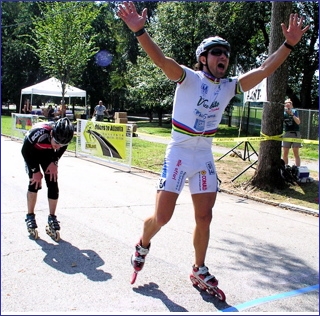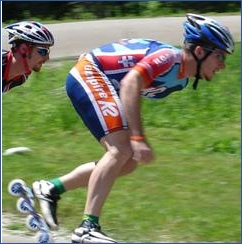 | ||
| ||||||||
By Peter Doucet
Italian Mauro Guenci wins the 2006 a2a in a time of 4 hours, 50 minutes and 8 seconds. Photo: Trish Gorman Many of my friends ask me which event is harder: the New York 100K or the Athens to Atlanta Road Skate? Having skated both several times, I would have to say the a2a, which I consider to be the toughest of the tough races. The 100K may boast a hill that skaters climb 19 times. But a2a is a full 87 miles (140 kilometers), and the extra-long distance trumps the 100K's 19 climbs. The next question that friends ask me is, how do you survive such long and grueling events? That's a more complicated question. But basically, the key is a combination of planning, smart skating and mental discipline. Map Your Goals The first thing you should do when approaching a race like a2a is to think about your goals. Are you racing to win or place near the front? Or are you just trying to go the distance? ... Or maybe it's a combination of the two. Once you decide on your goals, you will be ready to start mapping your strategy. Strategy By thinking and strategizing before and during the race, you increase your chances of success. For example, if you are a weak hill climber, consider going to the front of your group before you reach hills. That way you can set an easy pace going up. Or, go on small breakaways before the hills, so you can climb at your own pace. In this way, by the time your group catches you, you will be at the top and ready to hop back into the pack. Best Laid Plans Remember things usually don't go as planned. No matter what your strategy, you will likely need a back-up ... and a back-up to that back-up. Friend and Foe Safety Tips:
As with any race, it is also important to scope out your competition. Figure out who the friendlies are (the skaters who will work cooperatively with you) and who will be trying to leave you in the dust. Keep Cool Don't panic if a few skaters go bananas during the first 5 kilometers. If they are not among the typical top-10 finishers, like Eddy Matzger and Aaron Arndt, don't worry too much about them. Chances are the pack will catch them before long. Every time I've skated a2a, there have been some people who want to make a statement and lead really hard. Fine. Let these "big" boys and girls do the pulling. And speaking of big girls, here's a suggestion for the boys: If women who are competing for placements join your pack, let them race! Don't get in their way. This is just a personal preference, but I always like to see the guys let the girls have their own race, especially in the last few kilometers when it's time to move up and pass. Drafting Drafting will help you tons and tons. I always try to find a pack that is cooperative, rather than competitive. In a group like this, the stronger skaters take turns at the lead. Then when one drops back, the new leader waits for the ex-leader to settle back into the pack before picking up the pace. Pack Rats Don't forget the basic rules of pack skating:
Sustenance At various points along the a2a road course, you will come to water stations, which aside from water bottles will be stocked with bananas. If you're not carrying your own food and water, it is very important to take advantage of the stations. Proper nutrition can make or break you at a2a. Power Gels I carry power gels with me and consume one every half hour. I take them on a fixed schedule: one at 15 minutes after the hour, the next at 45 minutes after the hour. It takes me between 4.5 and 5 hours to finish the race. So, in the course of the event, I consume nine or ten power gels.
I also carry a water bottle that I fill with an extremely thick and heavy mixture of Gatorade. I take one or two gulps of this every half hour, along with some water. (By the way, don't forget to enjoy the post-a2a food. It's great! Mmmmm!) Don't Get Lost! I don't think there is anything more stressful than getting lost during a race. You can ask my friend Ed Leung, who once got lost in the back country of Georgia. (Imagine an Asian man dressed in a tight spider-man skin suit trotting around the back-roads on skates. As far as I'm concerned, that's asking for trouble!) I've also taken a few wrong turns at a2a. And I can tell you, there's nothing fun about it! Skaters aren't the only ones who get lost on the 87-mile trek. Support vehicles often taken wrong turns and fail to rendezvous with their skaters at water stations. In fact, some support vehicles have been so lost that they arrived at the finish line in Atlanta long after their skaters! To keep from getting lost, follow the S's that a2a organizers have painstakingly painted on the pavement. Know When Not to Skate Conserve your strength. When you reach a downhill, glide! If it's really fast, shift your weight over your heels to avoid speed wobble (skates shaking side-to-side uncontrollably). When it's time to climb, take shorter steps and stand up a little straighter. Go up at your own pace — unless you're racing someone or want to tire out the skaters in your group. (There's nothing worse than someone who likes to attack over and over again during a 140K race!) Draft, Draft, Draft When you don't have to push or skate hard, stand up and straighten your legs. While you're in a pack, take advantage of the group dynamics. Get into the front or near the front, and let the pack "push you" as it compresses after a downhill or after catching a breakaway. If your pack catches a group of skaters, don't slow down. Try to maintain your momentum. This will save you the energy of having to speed up again and allow you to cover a few extra meters without expending much energy. It's In Your Head During a2a, you're likely to experience a full range of emotions, from purest joy to ultimate despair, as the miles push your body to its limits. You'll hit rock bottom at one point and later soar to some incredible heights. Another thing you are likely to experience is "The Wall." I've hit it each time I've skated a2a. Up against it, I felt like I was hardly moving. My legs were frozen in pain. And my feet hurt so much that I desperately wanted to rip off my skates. But no matter how bad I felt, I always kept moving. I battled each negative thought and reminded myself that the pain would pass, which it does. I focused on skating my race and executing my plan to the best of my ability. I knew that finishing was something I would never regret and that it would provide me with more great stories to share with my students and website visitors. Enjoy the Ride During the race, you will roll through some breathtaking scenery in the company of fellow skate addicts. Enjoy this opportunity. Take in the scenery. Talk to your fellow skaters. Soak it all in. And have fun! Oct. 4, 2007 ...
Related reading: • Skate Tip of the Week Archive
...
Copyright © 2007 by Robert Burnson | ||||||||


